From Multimillionaire to Mobile Home
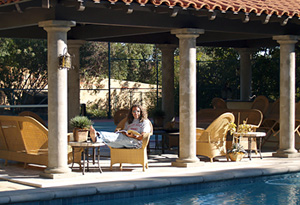
Photo: Courtesy of Tom Shadyac
Several years ago, Tom Shadyac seemed to have it all: a multimillion-dollar career directing Hollywood blockbusters like Bruce Almighty and The Nutty Professor, a 17,000-square-foot mansion, fancy cars, the luxury of flying in private jets, invitations to extravagant parties and more. It was a life many people dream about.
Despite these many luxuries, Tom says something just didn't feel right.
"I was standing in the house that my culture had taught me was a measure of the good life," Tom recalls in his documentary I Am. "I was struck with one very clear, very strange feeling: I was no happier."
Tom says he had been feeling a sense of emptiness for quite a while when a traumatic bike accident in 2007 left him with excruciating post-concussion syndrome. After several months of what he describes as "torture," Tom began to welcome death.
"Facing my own death brought an instant sense of clarity and purpose," he says in his film. "If I was, indeed, going to die, I asked myself: What did I want to say before I went? It became very simple and very clear. I wanted to tell people what I had come to know. And what I had come to know was that the world I was living in was a lie."
Five months after his accident, Tom began filming I Am to get to the bottom of two burning questions: What's wrong with our world, and what can we do about it?
Despite these many luxuries, Tom says something just didn't feel right.
"I was standing in the house that my culture had taught me was a measure of the good life," Tom recalls in his documentary I Am. "I was struck with one very clear, very strange feeling: I was no happier."
Tom says he had been feeling a sense of emptiness for quite a while when a traumatic bike accident in 2007 left him with excruciating post-concussion syndrome. After several months of what he describes as "torture," Tom began to welcome death.
"Facing my own death brought an instant sense of clarity and purpose," he says in his film. "If I was, indeed, going to die, I asked myself: What did I want to say before I went? It became very simple and very clear. I wanted to tell people what I had come to know. And what I had come to know was that the world I was living in was a lie."
Five months after his accident, Tom began filming I Am to get to the bottom of two burning questions: What's wrong with our world, and what can we do about it?
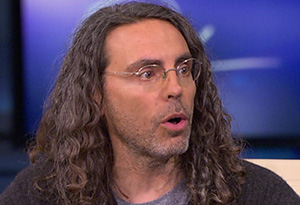
Tom says that part of what's wrong with our world—and the lie that he says he was living—is our culture's definition of success.
"[We have] a very extrinsic model of success," he explains. "You have to have a certain job status, a certain amount of wealth. ... I think true success is intrinsic. ... It's love. It's kindness. It's community."
As Tom journeyed on his quest to find out what would truly make him happy and help unearth what's wrong with our world, he made major changes to his lifestyle. Today, Tom lives in a modest mobile home, bikes to work and flies commercial airlines—and he says he's never been happier.
Take a tour of Tom's mobile home and see what his life is like now
"I started to wake up to certain hypocrisies in my life about 10 or 12 years ago, and I started shifting things as I asked [myself] more and more questions," Tom says. "The bike accident is what compelled me to share my journey."
"[We have] a very extrinsic model of success," he explains. "You have to have a certain job status, a certain amount of wealth. ... I think true success is intrinsic. ... It's love. It's kindness. It's community."
As Tom journeyed on his quest to find out what would truly make him happy and help unearth what's wrong with our world, he made major changes to his lifestyle. Today, Tom lives in a modest mobile home, bikes to work and flies commercial airlines—and he says he's never been happier.
Take a tour of Tom's mobile home and see what his life is like now
"I started to wake up to certain hypocrisies in my life about 10 or 12 years ago, and I started shifting things as I asked [myself] more and more questions," Tom says. "The bike accident is what compelled me to share my journey."
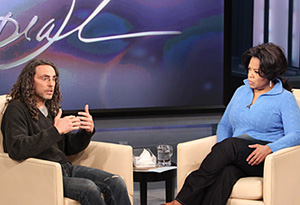
Photo: George Burns/Harpo Studios
Tom's journey can be seen in his provocative documentary I Am as he asks important questions about life, human nature, human behavior and our culture to dig down deeper and understand why the world is the way it is.
Find out when I Am opens in your town
To find out why the world is the way it is, Tom explored the readings of scientists, philosophers, poets and others, and spoke with thought leaders, including Archbishop Desmond Tutu, scientist Dean Radin, researcher Rollin McCraty of the HeartMath Institute, journalist Lynn McTaggart, professor Dacher Keltner of U.C. Berkeley, author Thom Hartmann and more.
What he discovered revolves around three key concepts that are explored in I Am:
1. It is scientifically proven that the entire human race is connected.
2. It is human nature to be cooperative rather than competitive.
3. If you don't do what your heart wants you to do and follow your passion, it will destroy you.
Find out when I Am opens in your town
To find out why the world is the way it is, Tom explored the readings of scientists, philosophers, poets and others, and spoke with thought leaders, including Archbishop Desmond Tutu, scientist Dean Radin, researcher Rollin McCraty of the HeartMath Institute, journalist Lynn McTaggart, professor Dacher Keltner of U.C. Berkeley, author Thom Hartmann and more.
What he discovered revolves around three key concepts that are explored in I Am:
1. It is scientifically proven that the entire human race is connected.
2. It is human nature to be cooperative rather than competitive.
3. If you don't do what your heart wants you to do and follow your passion, it will destroy you.
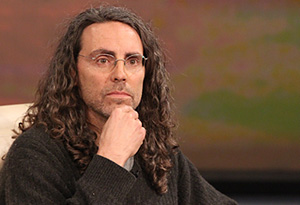
Photo: George Burns/Harpo Studios
In I Am, Tom says, "There's one fundamental law that all of nature obeys that mankind breaks every day. Now, this is a law that's evolved over billions of years, and the law is this: Nothing in nature takes more than it needs."
In our culture, however, humans often take more than they need by buying large homes, driving expensive cars and living excessively, as Tom says he did.
"We have a term for something in the body when it takes more than its share," Tom says in the documentary. "We call it cancer."
Tom says he didn't want to be a part of that cancer—he wanted to be a part of the healing. "We must lose this cancerous idea that we have to take everything we can," he says.
"But [you're] not saying we have to give up all the stuff," Oprah says, turning to the audience. "He's saying that you look inside yourself and ask the questions of yourself."
"I can judge no one. And my path is different than someone else's," Tom says. "It's a simple life. I haven't given up everything. I don't want to overdramatize this. I simply met myself at my needs."
In our culture, however, humans often take more than they need by buying large homes, driving expensive cars and living excessively, as Tom says he did.
"We have a term for something in the body when it takes more than its share," Tom says in the documentary. "We call it cancer."
Tom says he didn't want to be a part of that cancer—he wanted to be a part of the healing. "We must lose this cancerous idea that we have to take everything we can," he says.
"But [you're] not saying we have to give up all the stuff," Oprah says, turning to the audience. "He's saying that you look inside yourself and ask the questions of yourself."
"I can judge no one. And my path is different than someone else's," Tom says. "It's a simple life. I haven't given up everything. I don't want to overdramatize this. I simply met myself at my needs."
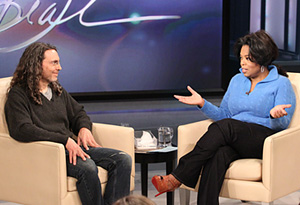
Photo: George Burns/Harpo Studios
In a culture that takes more than it needs and gets caught up in the quest for wealth and power, Oprah says that one of the ways we've gotten so off course is the obsession with celebrity.
Tom: Celebrity should be celebrated. We should celebrate you and others for your talent. For your gift. ... [However,] when we put people on a pedestal, [we get] in the way of our authentic selves.
Oprah: But look at what we did as a culture. First, there was celebrating people because they did something or had an achievement. And now, this culture celebrates people for doing absolutely nothing.
Tom: Yes. ... The irony is we call it "reality TV." It's anything but reality.
Oprah: But aren't we a part of it?
Tom: Oh, my gosh, yes.
Oprah: Aren't we the feeder system? Everybody who's watching it? We're the feeder system. You can see how it reflects us, and we reflect it.
Tom: The audience—you guys have all the power. You see, you have to stop elevating us. I don't want to be your hero. I want to be your brother. You know, I want to be your family member. I want to be your equal. And if you start seeing things as they are, like as the divine sees it...who will celebrate the women who swept this floor as much as any artist because she is an artist too. We're all artists. If you guys start doing that, it will change.
Tom: Celebrity should be celebrated. We should celebrate you and others for your talent. For your gift. ... [However,] when we put people on a pedestal, [we get] in the way of our authentic selves.
Oprah: But look at what we did as a culture. First, there was celebrating people because they did something or had an achievement. And now, this culture celebrates people for doing absolutely nothing.
Tom: Yes. ... The irony is we call it "reality TV." It's anything but reality.
Oprah: But aren't we a part of it?
Tom: Oh, my gosh, yes.
Oprah: Aren't we the feeder system? Everybody who's watching it? We're the feeder system. You can see how it reflects us, and we reflect it.
Tom: The audience—you guys have all the power. You see, you have to stop elevating us. I don't want to be your hero. I want to be your brother. You know, I want to be your family member. I want to be your equal. And if you start seeing things as they are, like as the divine sees it...who will celebrate the women who swept this floor as much as any artist because she is an artist too. We're all artists. If you guys start doing that, it will change.
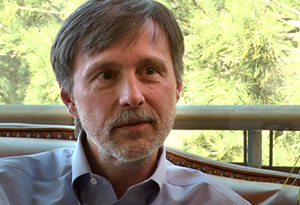
Photo: I Am/Shady Acres Entertainment
A big revelation in I Am is that our culture is wrongly built around the idea of competition. Tom says in the film, "That's pretty much the message that I got as a kid: 'Separate yourself from the pack.' 'Be number one.' And 'Win.'"
Though our culture may be built around competition, I Am strives to answer the question of whether it's competition or cooperation that is the essential nature of humans.
"If you talk to people in aboriginal or indigenous cultures, you find the highest societal values is cooperation. And competition is a very low value. And competition beyond certain boundaries is considered mental illness," says author Thom Hartmann in I Am. "You look at our culture, and cooperation is considered a relatively low value. And competition is considered the highest value. We celebrate the most powerful competitors."
But is competition the true essence of human nature? Thom says that scientists decided to test this hypothesis and found that it is not.
"What [scientists] found was that democracy was being played out literally every day by ... animals," Thom says. He recalls his own experiences of going scuba diving and seeing schools of fish dart around as a collective group, and also remembers watching flocks of birds in his backyard fly together and change directions suddenly while still remaining together.
"How did they know?" Thom asks. "Well, it turns out, when you do the slow-motion photography, they're all voting literally with every wing beat or with every gill beat. They're voting hundreds of times a minute. And [the scientists] said, 'We found this from insects all the way up to primates.' The basis of nature is cooperation and democracy. It's in our DNA."
Though our culture may be built around competition, I Am strives to answer the question of whether it's competition or cooperation that is the essential nature of humans.
"If you talk to people in aboriginal or indigenous cultures, you find the highest societal values is cooperation. And competition is a very low value. And competition beyond certain boundaries is considered mental illness," says author Thom Hartmann in I Am. "You look at our culture, and cooperation is considered a relatively low value. And competition is considered the highest value. We celebrate the most powerful competitors."
But is competition the true essence of human nature? Thom says that scientists decided to test this hypothesis and found that it is not.
"What [scientists] found was that democracy was being played out literally every day by ... animals," Thom says. He recalls his own experiences of going scuba diving and seeing schools of fish dart around as a collective group, and also remembers watching flocks of birds in his backyard fly together and change directions suddenly while still remaining together.
"How did they know?" Thom asks. "Well, it turns out, when you do the slow-motion photography, they're all voting literally with every wing beat or with every gill beat. They're voting hundreds of times a minute. And [the scientists] said, 'We found this from insects all the way up to primates.' The basis of nature is cooperation and democracy. It's in our DNA."
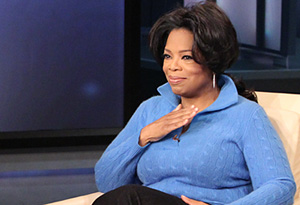
Photo: George Burns/Harpo Studios
For the past 25 years, The Oprah Show has been telling people stories in hopes of connecting us all—sometimes people have laughed, and other times people have broken into what Oprah calls "the ugly cry." Now, Tom tells us that there is real science behind all of our responses.
That science is rooted in something called the vagus nerve, a bundle of nerves that triggers strong emotions within our bodies. "If we show people images in the lab that are classic sources of wanting to connect, the vagus nerve fires," explains professor Dacher Keltner in I Am. "It's when your chest kind of expands and you tear up. And you get this big rush."
"I understood that when they did the testing of the vagus nerve that they used a lot of Oprah Show clips for that," Oprah says to Tom.
"Well, the truth is that you have been the greatest igniter of the vagus nerve in the past 25 years!" Tom says. "By showing other human beings' stories that we all respond to, [Oprah] is helping evolution."
That science is rooted in something called the vagus nerve, a bundle of nerves that triggers strong emotions within our bodies. "If we show people images in the lab that are classic sources of wanting to connect, the vagus nerve fires," explains professor Dacher Keltner in I Am. "It's when your chest kind of expands and you tear up. And you get this big rush."
"I understood that when they did the testing of the vagus nerve that they used a lot of Oprah Show clips for that," Oprah says to Tom.
"Well, the truth is that you have been the greatest igniter of the vagus nerve in the past 25 years!" Tom says. "By showing other human beings' stories that we all respond to, [Oprah] is helping evolution."

Photo: George Burns/Harpo Studios
Another one of the important concepts in I Am is one that Oprah has said for years: If you don't do what your heart wants you to do and follow your passion, it will destroy you.
"People find happiness in direct proportion to doing what they love," she says. "If you don't do what you love, you die a little every day."
For this reason, Tom says he will not stop making comedies—he will always follow his heart. "I love comedy," he says. "I would happily serve that again. But I also have to do what's in my heart, which is ... I feel like I need to carry on this conversation."
Following one's heart may require him or her to make changes in life, and the way people change, Tom says, is to ask questions. The main question he wants people to ask themselves is this: Who are you? Not what your culture has told you to be, but who are you on the inside?
"I think many of us are living inauthentic lives," he says. "Authenticity means to be the author of your own life. I think many of us are telling stories that have been given to us rather than our own story."
More
"People find happiness in direct proportion to doing what they love," she says. "If you don't do what you love, you die a little every day."
For this reason, Tom says he will not stop making comedies—he will always follow his heart. "I love comedy," he says. "I would happily serve that again. But I also have to do what's in my heart, which is ... I feel like I need to carry on this conversation."
Following one's heart may require him or her to make changes in life, and the way people change, Tom says, is to ask questions. The main question he wants people to ask themselves is this: Who are you? Not what your culture has told you to be, but who are you on the inside?
"I think many of us are living inauthentic lives," he says. "Authenticity means to be the author of your own life. I think many of us are telling stories that have been given to us rather than our own story."
More
- Find out if Tom is happier now and what he did with all his money
- Meet three young men who have followed their hearts and taken action in a big way
- Discover how you can start by making an impact this Sunday!



